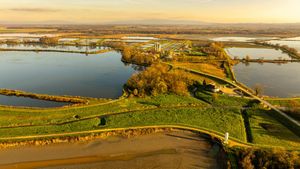Countries around the world are gearing up for the annual UN climate summit, COP29, which kicks off on Monday, with attendees arriving in Baku, Azerbaijan. The urgency of the gathering is heightened by the aftermath of extreme weather events experienced this past year, which have intensified the focus on climate financing. Delegates are prepared to negotiate over difficult issues, particularly the need for significant financial support to assist developing nations grappling with the detrimental consequences of climate change.
The central focus for this summit is to establish a commitment for up to $1 trillion annually to bolster climate finance for developing countries, transitioning away from the current $100 billion pledge set to expire. Such negotiations are not happening in isolation; they occur against the backdrop of multiple global crises, including the war impacts from Ukraine and Gaza, along with the political climate influenced by the recent re-election of Donald Trump, who has publicly expressed skepticism about climate change.
Hosts Azerbaijan face dual challenges: maintaining the summit's focus on climate change objectives and addressing their own complex relationship with fossil fuel dependency. The country's oil and gas sector continues to significantly contribute to its economy, accounting for about 35% of its revenue. Azerbaijan’s presence at COP29 is particularly significant as it emphasizes the country’s attempts at balancing its fossil fuel interests with commitments to environmental sustainability, especially noted by the government’s own projection of decreased dependency on fossil fuels over coming years.
Before substantive climate talks commence, consensus on the agenda must be reached among participating nations. A last-minute proposal put forth by China has added another layer of complexity. On behalf of the BASIC countries—Brazil, India, and South Africa—China has pushed to include the discussion of trade disputes related to climate measures like the European Union’s planned carbon border tariffs. This proposal intertwines trade concerns with climate discussions and reflects the shifting geopolitical dynamics with Trump's re-election, signaling potential setbacks for US involvement and leadership on climate initiatives.
The growing anxieties around Trump's administration and its historical stance against climate action complicate prospects for significant agreements at the summit. His administration's previous endeavors to withdraw from global climate accords, including the Paris Agreement, are fresh memories. Friends and foes at the conference alike are bracing for the repercussions of what this could mean for international cooperation on climate policy.
African nations have experienced unprecedented flooding this year, compounded by droughts affecting agricultural yields across regions, including South America and the western United States. This reality signifies heightened urgency at COP29, as many regions are ill-prepared for the extreme weather conditions predicted to worsen if global temperatures continue to rise.
Participants are acutely aware of the risks associated with the US's potential disengagement; many countries view the US—being one of the largest historical contributors to greenhouse gas emissions—as pivotal to the overall progress needed during the climate negotiations. Marc Vanheukelen, former EU climate envoy, expressed concerns about this influence, highlighting how weakened ambitions from the US might deter other countries from adhering to their commitments.
With the temperature projections indicating 2024 could become the hottest year on record, climate scientists and environmental advocates stress the importance of collective global action. The physical realities of climate change do not pause for political transitions, reminding delegations at COP29 of the pressing need for decisive measures.
Azerbaijan, attempting to position itself as a partner for Europe amid increasing tensions from the energy crisis stemming from the Ukraine conflict, has lobbied hard for countries to accelerate their role in clean energy. President Ilham Aliyev has termed their fossil fuel resources as blessings, presenting natural gas as pivotal during this transitional phase. The government's proposal to establish a Climate Finance Action Fund seeks to generate voluntary contributions from extractive industries to a collective fund aimed at addressing climate-related challenges.
Nationwide actions will also spotlight Azerbaijan’s growing commitment to renewable energy sources. The country aims to transition 35% of its energy production to renewable sources by 2030, up from around 20% last year. Critics, including environmental organizations, argue against this dual approach—highlighting the inherent contradiction of advertising gas as green energy. The discourse around this strategy has intensified as international observers question Azerbaijan's commitment to genuine climate action.
The summit is not without controversy; Azerbaijan is facing scrutiny over its democratic processes and human rights records, particularly concerning the treatment of journalists and ethnic minorities. Despite pushes for reform, Azerbaijan’s leadership maintains its stance, warning external criticism could derail sensitive peace negotiations within the region.
Globally, the tone at COP29 reflects both optimism for progress and concern over existing paths backward, particularly as some countries revisit their commitments based on the new political climate shaped by Trump. The potential reversal of US policies could create uncertainty heading forward, pressing other nations to reevaluate their climate ambitions.
Azerbaijan’s ability to manage these negotiations will be pivotal, as cooperation becomes increasingly necessary for meaningful progress on climate action. The importance of securing agreements from the world's large polluters, particularly following Trump's re-election, may pivotally reshape the discussions and outcomes of this year’s summit.
All eyes will be on Baku as world leaders, experts, and advocates come together, bringing forth hopes for climate finance solutions amid fierce debates on energy needs, trade disputes, and the pressing climate realities affecting millions across the globe. How the next steps unfurl during COP29 could very well outline the trajectories of global climate strategy and cooperation going forward.



